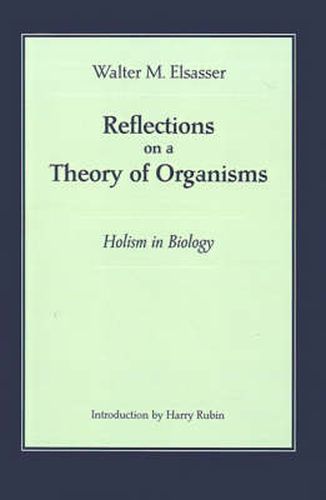Readings Newsletter
Become a Readings Member to make your shopping experience even easier.
Sign in or sign up for free!
You’re not far away from qualifying for FREE standard shipping within Australia
You’ve qualified for FREE standard shipping within Australia
The cart is loading…






Are living organisms – as Descartes argued – just machines? Or is the nature of life such that it can never be fully explained by mechanistic models? In this thought-provoking and controversial book, eminent geophysicist Walter M. Elsasser argues that the behavior of living organisms cannot be reduced to physico-chemical causality. Suggesting that molecular biology today is at the same point as Newtonian physics on the eve of the quantum revolution, Elsasser lays the foundation for a theoretical biology that points the way toward a natural philosophy of organic life. Explicitly repudiating “vitalism” (the notion that the laws of nature need to be modified when applied to living organisms), Elsasser argues instead that the structural complexity of even a single living cell is"transcomputational" – that is, beyond the power of any imaginable system to compute. Beginning from this insight, Elsasser leads the reader through a step-by-step process that ultimately arrives at the conclusion that living and non-living matter are separated by “a no-man’s land of irrationality”.Trained in Germany as a physicist, Elsasser first pondered the implications of quantum mechanics for biology as early as 1951. The more closely he studied the inherent complexity of life, the more skeptical he became of the reductionist view of organisms as tiny machines. “An organism”, he concluded, “is a source of causal chains which cannot be traced beyond a terminal point because they are lost in the unfathomable complexity of the organism”. Like the physicist who works within the bounds of an unfathomable universe, Elsasser argues, the biologist must seek answers within a system that is no less unfathomable.
$9.00 standard shipping within Australia
FREE standard shipping within Australia for orders over $100.00
Express & International shipping calculated at checkout
Are living organisms – as Descartes argued – just machines? Or is the nature of life such that it can never be fully explained by mechanistic models? In this thought-provoking and controversial book, eminent geophysicist Walter M. Elsasser argues that the behavior of living organisms cannot be reduced to physico-chemical causality. Suggesting that molecular biology today is at the same point as Newtonian physics on the eve of the quantum revolution, Elsasser lays the foundation for a theoretical biology that points the way toward a natural philosophy of organic life. Explicitly repudiating “vitalism” (the notion that the laws of nature need to be modified when applied to living organisms), Elsasser argues instead that the structural complexity of even a single living cell is"transcomputational" – that is, beyond the power of any imaginable system to compute. Beginning from this insight, Elsasser leads the reader through a step-by-step process that ultimately arrives at the conclusion that living and non-living matter are separated by “a no-man’s land of irrationality”.Trained in Germany as a physicist, Elsasser first pondered the implications of quantum mechanics for biology as early as 1951. The more closely he studied the inherent complexity of life, the more skeptical he became of the reductionist view of organisms as tiny machines. “An organism”, he concluded, “is a source of causal chains which cannot be traced beyond a terminal point because they are lost in the unfathomable complexity of the organism”. Like the physicist who works within the bounds of an unfathomable universe, Elsasser argues, the biologist must seek answers within a system that is no less unfathomable.